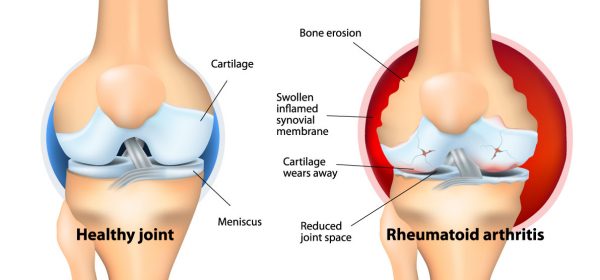What is Rheumatoid Arthritis?

April 11, 2017
While many think of rheumatoid arthritis, often referred to simply as RA, as being a disease solely of people’s joints, the fact is that this chronic inflammatory disorder can be more widespread than just that part of the body. Rheumatoid arthritis is actually an autoimmune disorder. The immune system mistakenly attacks the body’s tissues, leading to the inflammation.
And while osteoarthritis causes damage over time, the swelling caused by RA can immediately have painful effects, as the lining of joints are attacked. This can even lead to bone erosion and joint deformities. The inflammation that is caused by this autoimmune disorder can also have negative impacts on many other of the body’s organs, including the skin, heart, eyes, lungs and can even impact the body’s blood vessels.
How Do You Treat It?
The treatment for RA has come a long way. And while it cannot be cured, modern day treatments can afford a great deal of relief. Currently treatment has four goals, to reduce inflammation, improve quality of life, reduce side effects and prevent further damage and avoid the risk of permanent damage.
The types of treatment available can be broken into two categories: medical intervention as well as those treatments that do not require a doctor. The most effective complete treatments will make use of both.
Medical Intervention
Drugs
There is ongoing research being conducted to try and find more effective medicines to either cure or treat RA. For the time being, NSAIDs are one of the most commonly used medications, as they provide pain relief while also reducing swelling. NSAID stands for non-steroidal anti-inflammatory drugs, and can be purchased over the counter in the familiar forms of drugs sold under brand names such as Advil, Motrin and Aleve. These are ibuprofen and naproxen. NSAIDs are also available in stronger forms, prescribed by a doctor, but these can present sever side effects, including liver or kidney damage, ringing in the ears or heart problems. They also cause an upset stomach for many, although a doctor can prescribe special kinds of NSAIDs to avoid this.
Some other drugs used to treat RA include corticosteroids, which slow the immune disorder from attacking the body by working in a similar manner to hormones. The side effects to these medications include weight gain, mood swings, leg swelling and an increase in blood pressure. DMARDs, which stands for disease-modifying antirheumatic drugs, also seeks to slow the progression of the disease, primarily trying to avoid permanent damage and when used over time can reduce pain. The side effects of this drug depends on the DMARD used, as well as the individual’s specific body.
Surgery
For instances of severe joint damage, the more extreme treatment of surgery may be necessary to reverse damage and restore the use of deformed joints. Examples of surgeries used to treat RA include joint replacement where a prosthetic replaces a joint, joint fusion where a joint is realigned by being fused and tendon repair, which seeks to improve joints by repairing joints that have been damaged by the inflammation caused by RA.
Physical Therapy
This option comes in right between medical and non-medical interventions. While physical therapy is generally prescribed by a doctor, a good physical therapist will be able to advise their patient on a wide range of non-medical treatments for RA. Another advantage of a physical therapist? A workout routine that they help you design to combat RA will only have positive side effects on your body!
Non-Medical Treatments
Exercise
Whether you develop a routine with a physical therapist or on your own (so long as it’s doctor improved), a low-impact but regular exercise regime can be one of the most effective treatments in combatting RA.
A Good Night’s Sleep
Studies have shown that being well rested is important in combating RA, whereas being rundown or overly tired can lead to progression of the disease.
Diet
There actually specific foods that have proven anti-inflammatory properties. Additionally, carrying around extra weight is not helpful for RA.
While there still isn’t a cure for RA, the earlier that a person with this disease gets treatment, the more likely their RA will go into remission or cause less of a disruption to their life. So don’t wait to get treatment if you suspect you may have RA.
